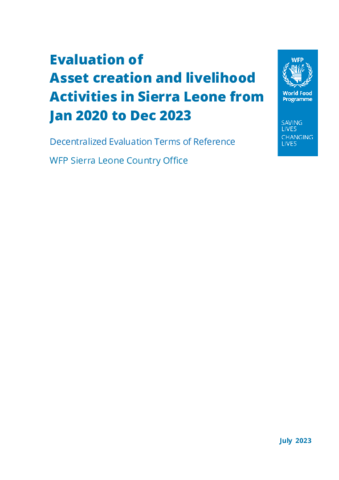
The evaluation was commissioned to provide evidence on the effects of the programme in terms building self-reliance and strengthening the resilience of vulnerable smallholder farmers (SHF) and communities in Sierra Leone and was intended for both accountability and learning purposes, with a focus on learning.
It focused on assessing the Effectiveness, Efficiency, Impact, Sustainability and Coherence if the interventions with a particular focus on Relevance, Effectiveness and Sustainability, mainstreaming Gender Equality and Empowerment of Women throughout.
Overarching evaluation questions focused on:
- To what extent is the intervention relevant the needs and priorities of the government, targeted population and stakeholders?
- To what extent has the intervention achieved, or is expected to achieve, its objectives and outcomes?
- To what extent did the intervention achieve an optimal use of the budget and time allocated?
- To what extent is the intervention appropriate/compatible with other interventions in a country, sector or institutions?
- To what extent has the intervention generated or is expected to generate significant positive or negative effects, intended or unintended, at a higher level?
- To what extent will the activities and achievements of the intervention be sustained long-term?
The evaluation covered the following activities: Asset development and associated in-kind or cash payments through Food-Assistance-for-Assets (FFA) via through Farmer Based Organizations (FBOs), integrated nutrition, local capacity strengthening with trainings targeting Ministry of Agriculture and Food Security (MAFS) staff and Smallholder Farmers, gender youth empowerment through sensitization activities.
Key evaluation findings included:
- Relevant Design and Inclusivity: The ACL interventions are well-designed to address agricultural needs, food insecurity, and economic challenges. They effectively promote diversity, especially benefiting women and smallholder farmers, though barriers related to cultural norms and disabilities still exist. Environmental considerations need enhancement.
- Effective FFA and IVS Models: Food for Assets (FFA) and the Integrated Village Solutions (IVS) models have proven effective in incentivizing participation, improving financial inclusion, and enhancing agricultural practices. However, challenges with maintenance of irrigation infrastructure and timely input provision persist.
- Training and Nutrition Integration: Training initiatives, particularly in rice production, are well-received and improve farming practices. Integrating a nutrition-sensitive approach has increased crop diversity and improved community nutrition, although post-harvest losses and supply chain issues remain significant challenges.
- Village Savings and Market Linkages: Village Savings and Loan Associations (VSLAs) successfully enhance savings habits and income-generating activities, though their impact on broader financial inclusion is limited by low coverage. Linkages to WFP markets have provided economic benefits, but delays and administrative processes hinder full potential.
- Impact and Sustainability: ACL interventions have significantly improved food security, income generation, and community development, with notable benefits in leadership and gender equity. Sustainability is promising due to improved capacities and market linkages, but challenges such as land tenure and input support need ongoing attention.
- Efficiency and Coherence: WFP has utilized its budget effectively but faces issues with input delivery and procurement delays. The interventions align well with national priorities and broader development objectives, demonstrating internal and external coherence in their implementation.
- Gender and Inclusion: The interventions have made strides in empowering women and youth, though barriers to full inclusion and gender equity persist. Further efforts in gender mainstreaming and addressing gaps in data collection are needed to enhance comprehensive assessments and equitable benefits.
Key recommendations from the evaluation included:
- Strengthen the integrated approach to resilience building by enhancing the strategic design of ACL interventions and improving implementation. This should involve clear articulation of inclusion, integration, sustainability, and scalability of ACL interventions.
- Enhance capacity-building efforts with an inclusive strategy for sustainable ACL interventions involving key sectors of nutrition, HGSF, Disaster Risk Reduction (DRR), environment, and gender.
- Address gaps in coverage and implementation of ACL interventions.
- Build on remedial actions already taken to address late procurement and payment delays.
- Strengthen environmental management in design and implementation of ACL interventions.
- Revise M&E to cover gaps in outcome and broader impact monitoring especially for nutrition, GEWE and resilience measurements.



